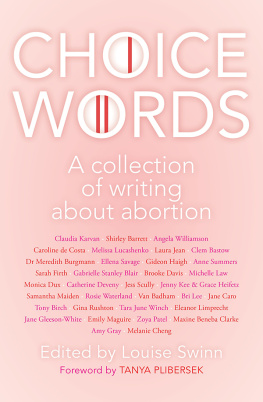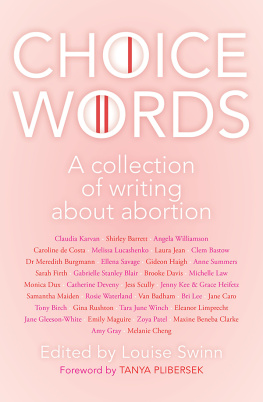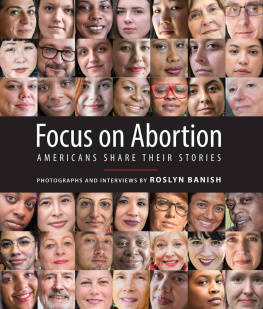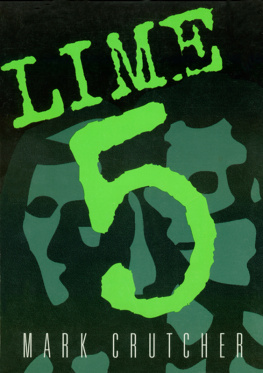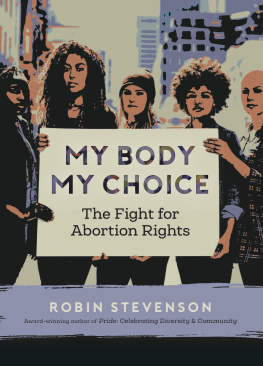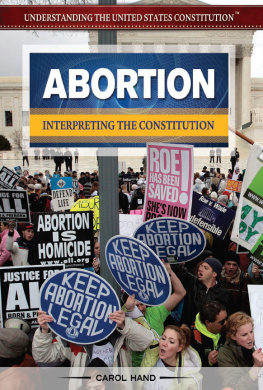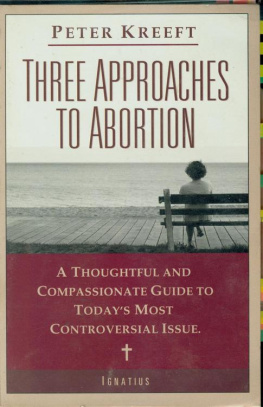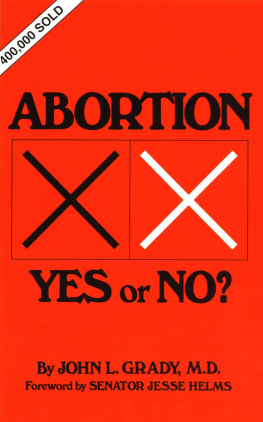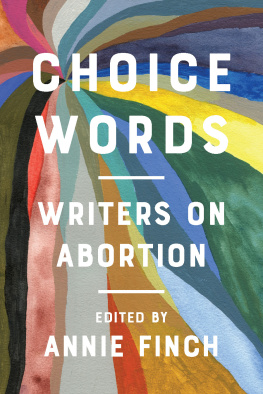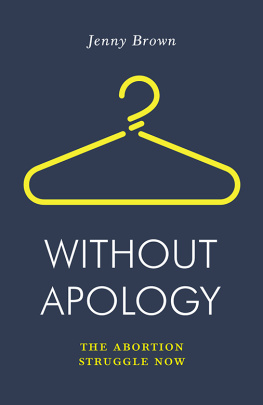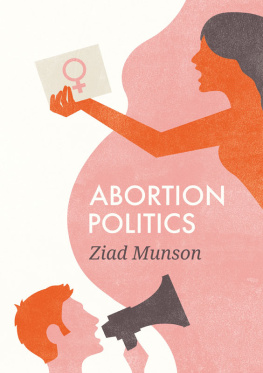The slutty whore from whoresville making us all look bad is an excerpt from Every Lie Ive Ever Told, Rosie Waterland, HarperCollins, Sydney, 2017.
A slice of life, 1965 is an excerpt from Ducks on the Pond: an autobiography 19451976, Anne Summers, Viking, Ringwood, 1999.
First published in 2019
Copyright in the collection Louise Swinn 2019.
Copyright in individual pieces with their authors
All rights reserved. No part of this book may be reproduced or transmitted in any form or by any means, electronic or mechanical, including photocopying, recording or by any information storage and retrieval system, without prior permission in writing from the publisher. The Australian Copyright Act 1968 (the Act) allows a maximum of one chapter or 10 per cent of this book, whichever is the greater, to be photocopied by any educational institution for its educational purposes provided that the educational institution (or body that administers it) has given a remuneration notice to the Copyright Agency (Australia) under the Act.
Allen & Unwin
83 Alexander Street
Crows Nest NSW 2065
Australia
Phone: (61 2) 8425 0100
Email:
Web: www.allenandunwin.com

ISBN 978 1 76087 522 0
eISBN 978 1 76087 115 4
Set by Midland Typesetters, Australia
Cover design: Sandy Cull/gogoGingko
Proceeds from the sale of this book will be donated to the Marie Stopes Australia Choice Fund.
In Australia abortion is unfortunately still deeply stigmatised. There is limited provision or funding of the service through the public health system. Addressing this stigma and ensuring people can access the service without fear of judgement is at the heart of Marie Stopes Australias advocacy work.
In 2017, in recognition of the limited public funding for abortion services, Marie Stopes Australia launched the Choice Fund. This philanthropic fund helps women experiencing financial and other hardships to access abortion care if and when they need it. Since its launch the fund has assisted 170 women to access abortion and contraception. Of the women the fund has assisted:
34 per cent reported domestic violence
33 per cent reported pre-existing mental health issues
13 per cent reported experiencing reproductive coercion
20 women were from rural and remote Australia
51 women were from New South Wales
88 women were from Queensland
28 women were from Victoria
Marie Stopes Australia is a national award-winning not-for-profit provider of sexual and reproductive health services. These services include abortion, contraception, vasectomy, tubal ligation and sexual health screening and treatment. The organisation advocates for Australians to have access to safe and high quality care. Any surplus funds generated by Marie Stopes Australia are invested into its Australian operations, Choice Fund and its regional sexual and reproductive health programs.
For more information visit https://www.mariestopes.org.au/
Contents
Back in 2005 a doctor told me a story about a young woman from a small rural community in Queensland. She was a mother of two children under the age of three. Both her children had been born premature because she suffered from severe pre-eclampsia.
She was not in a happy relationship. Her partner was unsupportive.
She was eight weeks pregnant with her third child when she travelled to a small country hospital some distance from her home, wanting to terminate her pregnancy. The doctor she saw wanted to help but was unable to arrange a surgical termination at the hospital. Her only option was to take the bus to the nearest large town, hundreds of kilometres away, to have an abortion at a private clinic.
Can you imagine? Catching a bus for hundreds of kilometres with two children under three so you could have a medical procedure. What would you even do with the toddlers while you were anaesthetised for surgery?
It did not come to that anyway, because the procedure would have cost more than $700. The young woman simply could not afford it, so she returned home from the hospital still pregnant.
At 26 weeks, she was back at the hospital severely ill for the third time with pre-eclampsia. She was airlifted to the same town where she might have had the pregnancy terminated. She had an emergency caesarean, the infant died and she spent a week in the high dependency unit.
So much unnecessary trauma. Unnecessary risk to a womans life. The loss of a baby. Unnecessary expense to the health system. This should not happen in a country like Australia.
It was this story, told to me by a Queensland doctor, and others like it, that made me understand how necessary it was to add RU486, the drugs used for a medical abortion, to the Pharmaceutical Benefits Scheme back in 2013.
I wanted to make sure a woman facing the difficult decision to terminate her pregnancy had more options available to her.
Adding RU486 to the PBS undoubtedly made it easier for some women to end an unwanted pregnancy. But the reality is that for many Australian women who have decided they want an abortion, it is still unaffordable and unattainable.
Abortion is one of the most common medical procedures that Australian women require in their lives. Over 80 per cent of Australians support a womans right to choose.
When I first delivered this speech at the annual Emilys List Oration in 2017, having an abortion was still a criminal act in both Queensland and New South Wales. That meant that it was a crime for half the women in Australia. The Queensland legislation originated in 1899, but it was not a law that was defunct in practice. A Brisbane couple were prosecuted for purchasing abortion drugs in 2010, and just last year a woman was prosecuted in New South Wales. But half of Queenslanders did not even know that abortion was illegal in their state.
A lot changed in a year. Generations of activists have fought for decriminalisation of abortion in Queensland, and Premier Annastacia Palaszczuk and Deputy Premier Jackie Trad took a momentous step forward for Australian women by passing decriminalisation legislation in October 2018. It is time for New South Wales to follow suit.
But decriminalisation is not the end of the battle. Since the last Labor government added RU486 to the PBS, the drug itself costs only $6.40 with a healthcare card. But the average price women actually pay for a medical termination is close to $600.
Access to safe, legal and affordable abortions is crucial but it is not the beginning and end of the fight for reproductive rights in Australia. Real reproductive freedom means the freedom to say yes or no to sex, being able to access appropriate contraception and maternal healthcare, and being able to have children without experiencing discrimination.
What is reproductive freedom?
I want to say up front that when I am talking about reproductive freedom I get that it is a lot messier than demanding rights, changing laws and providing health services.
We would like to hope that as women we can control our bodies, but too many of us have had unexpected pregnancies, or struggled to become pregnant when we desperately wanted a child, to imagine that we really control our bodies. We do the best we can to influence our fertility, but life and relationships and accidents, both tragic and happy, all play a role.
But when it comes to something as important as carrying and raising a child we deserve as much say as possible, as much choice as possible. Every child born should be loved and wanted.

